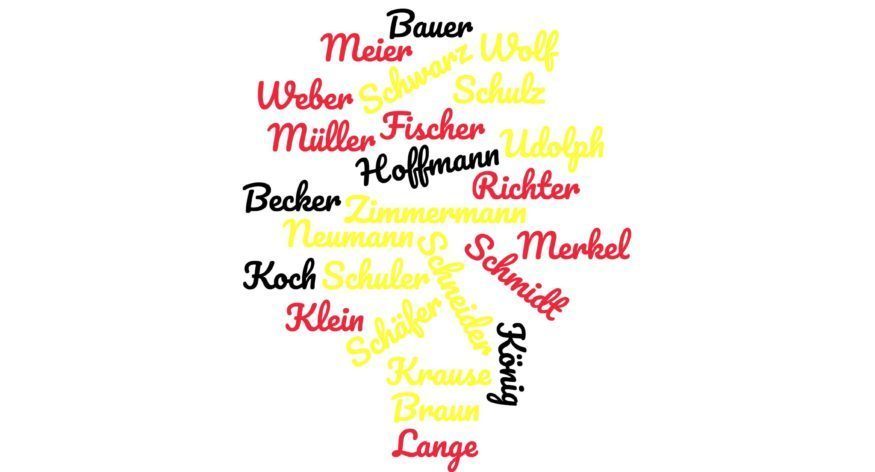How about the meaning of Schlauderaff?


If you’ve been researching your German ancestors — especially in light of MyHeritage’s release of the new and exclusive North Rhine-Westphalia Death Index 1874–1938 — you’ve probably been spending a lot of time with their surnames. Perhaps you’ve been wondering what those surnames mean and where they come from.
Search historical records on MyHeritage
German family names can be a fascinating gateway to the past — not only your family’s past, but also the history of Germany and the German language. In this post, we will explore the origins of German family names, how they developed, and how to research the surnames in your own family.
Where German surnames began
In the distant past, individuals were only given a first name. Most people lived in small villages with small populations, so if you called for someone named Heinrich, chances were the right Heinrich would turn around. However, as populations increased, the multitude of people who shared the same first name became confusing.
Around the 12th century, people began to differentiate between individuals who shared the same name using the Latin word dictus (“called”), or later, with the German genant (“called”), giheizen/heisset (“is called”), den man sprichet (“of whom you speak”), den man nennt (“the one who you call”), and so on.
It looked like this: Cunradus dictus Faber, Heinricus dictus Kreier, bruder Egebreht dem man sprichet der Wolhuser (“brother Egebreht who is called the Wolhuser”), Hans Rot genannt Rotlieb, Heinrich bi dem Bach. These additions eventually evolved into the surnames we know today: Heinrich dictus Schneider became Heinrich Schneider.
These surnames were not always family names, in the sense that they were not necessarily passed down in the family. A son and a father might have different surnames. It was only in the 19th century that surnames became hereditary. By the time periods covered by MyHeritage’s birth and marriage indexes from Hesse, for example, surnames were used for the entire family.
Today only, get free access to Germany, Hesse Marriage Index, 1849-1931 and Germany, Hesse Birth Index, 1874-1911!
Where did the German surnames come from?
German surnames generally fit into one of the following categories:
1. German Surnames derived from first names
These were originally names with two parts, such as:
- Berthold
- Burkhard
- Degenhardt
- Leonhart
- Siegmund
- Volkmar
- Wolfram
Some of them were later shortened to names such as:
- Siggi
- Volker
- Wolf
- Günter
- Bernd
- Gerd
- Kurt
What’s interesting about these names is that they contain old German words that are no longer in use. For example, ask (“spear”), beraht (“bright, radiant”), degan (“warrior”), fruma (“benefit, advantage, blessing”), hagen (“fenced place”), wig (“fight, struggle”), or witu (“wood”).
Names with Christian origins were quite popular:
- Johannes
- Nikolaus
- Petrus
- Matthias
- Jacobus
Names like these might have been shortened to Alex, Christoph, Nickel, or Franz.
2. German surnames derived from family origin
Some names signified tribal affiliation, such as:
- Baier
- Franke
- Friese
- Holländer
- Preuß (Preuss)
- Sachse
Others were based on place names: Hans from Nürnberg might be called Hans Nürnberger. Other examples include names such as:
- Bamberger
- Bielfeld
- Erfurt
- Fischbeck
- Oldenburg
Still others described the location where the person lived. For example:
- Althaus (“old house”)
- Birnbaum (“pear tree”)
- Brückner (someone who lives near a bridge)
- Buschmann (someone who lives near bushes)
- Holzer (someone who lives near a forest)
- Lindemann (“linden tree man”)
- Weidemann (“willow man” or “pasture man”)
- Kirchhof (“land around a church”)
- Angermann (“meadow man”)
3. German surnames derived from professions
This category includes many, many German names. Among them are:
- Bauer (“farmer”)
- Pflüger (“plowman”)
- Schäfer (“shepherd”)
- Jäger (“hunter”)
- Becker (“baker”)
- Koch (“cook”)
- Müller (“miller”)
- Schmied/Schmidt (“smith”)
- Stellmacher (“carriage maker”)
- Wagner (“wagon driver”)
- Gerber (“leather preparer”)
- Schuhmacher (“shoemaker”)
- Weber (“weaver”)
- Schneider (“tailor”)
- Zimmermann (“carpenter”)
- Kaufmann (“merchant”)
- Krüger (“innkeeper” or “merchant of glass and pottery”)
- Richter (legal official, from the word for “to make right”)
- Meier (“mayor”)
- Hofmann (“steward” or “estate manager”)
- Lehmann (“tennant” or “vassal”)
4. German Family names derived from characteristics
These names originated from descriptions of the person’s appearance, character, habits, and so on. For example:
- Kraus (“curly hair”)
- Groß/Gross (“large”)
- Klein (“small”)
- Lang (“long”)
- Schimmelpfennig (“miser”)
- Jung (“young”)
- Ritter (“knight”)
- Bär (“bear”)
- Fink (“fink”)
- Fuchs (“fox”)
- Hase (“rabbit”)
- Storch (“stork”)
- Vogel (“bird”)
- Knobloch (“garlic”)
There are an estimated 850,000 different surnames in Germany — a very high number!
How to research a German surname
When first approaching a German surname, it’s important to remember that each name originally had a meaning. For the most part, the name was chosen by people who knew the person and who used the name to describe him. For example, they might have called him Schneider because he was a tailor.
The most common way to explore a German surname is to create a distribution map using “Telefon-CDs” — CDs that contain phone book information, including the last names of people in specific households. Most people use the CD collections from around 1990–2000, because from that point forward, people began using cell phones, and the listings don’t contain any information about their place of residence. Telefon-CDs from that time contain around 35 million names, accounting for almost 50% of the population of Germany — enough to get a reliable picture of name distribution. Pre-election polls are another source: they account for around 1,500 people, and the information often matches the mood of the population very precisely.
There are plenty of other resources for researching German family names and plotting their distribution, many of which can be found among MyHeritage’s German historical records.
By plotting the distribution of a surname in Germany, you can determine whether the name originated in Germany or came into use due to immigration (mostly as a result of World War II).
It’s not always easy for a German speaker to understand the meaning of a family name. This is because names are often based on words that come from Middle High German or Middle Low German, which are no longer spoken in Germany. Languages evolve over time, and words often become archaic and are no longer used. But these words might be retained in names — such as place names and names of rivers. To understand the meaning of a name derived from obsolete words, you need to have a background in the history of the German language — especially Low German, which for a time was the dominant language of the entire Baltic Sea region in northern Germany.
Difficult names can only be interpreted by a linguist who is familiar with the historical layers of the language. This is not always easy for German names, particularly those among the Sorbian and Danish minorities.
German names from other languages
Another difficulty encountered in the interpretation of German names is the consequences of population shifts as a result of World War II. Approximately 16 million refugees and displaced persons moved to Germany after 1945, and many of their names are derived from other languages and dialects.
Because of this, many names in Germany are derived from all the languages of eastern and southeastern Europe, such as Polish, Yiddish, Czech, French, Baltic languages (Old Prussian, Lithuanian, and Latvian), Belarusian, Ukrainian, Russian, Romanian, Hungarian, Slovenian, Croatian, Serbian, Bulgarian, and so on. To understand the meaning of a name derived from these languages, you need to have a background in the Slavic, Baltic, Finno-Ugric, Romanic, Turkic, and other languages — not only the modern vernaculars, but the historical development of these languages and their dialects. As you can imagine, this is anything but easy.
There are a few institutions in Germany dedicated to researching the backgrounds of German names. This research takes time and patience. Sound information is not always readily available.
However, name research is one area of linguistics that attracts a great deal of interest. People are interested to learn not only the origins of family names, but also first names, place names, and names of natural landmarks. The latter are particularly difficult to interpret because they are old — sometimes very old. Determining the meaning of these names involves special challenges.
Still, even if you can’t determine the precise meaning of your German family names, it’s never been easier to research your German roots thanks to the availability of online records — some of which, like the North Rhine-Westphalia collection, are exclusive to MyHeritage. Knowing more about your family’s origins may help you understand more about their names, and vice versa. Keep all this in mind when you delve into German historical records, and you just might learn something new about your ancestors.
Learn more about German surnames on the MyHeritage wiki.
This is a loose translation of a piece written by Prof. Dr. Jürgen Udolph, which can be read in the original German here. Prof. Dr. Udolph is a name researcher, father of 4, and a tenured professor at Leipzig University, and he is the most sought-after expert today when it comes to the interpretation of names. He has researched more than 10,000 names in the past ten years.
Search historical records on MyHeritage











Otto Homeyer
July 6, 2020
I haven’t been able to find much information on this last name.